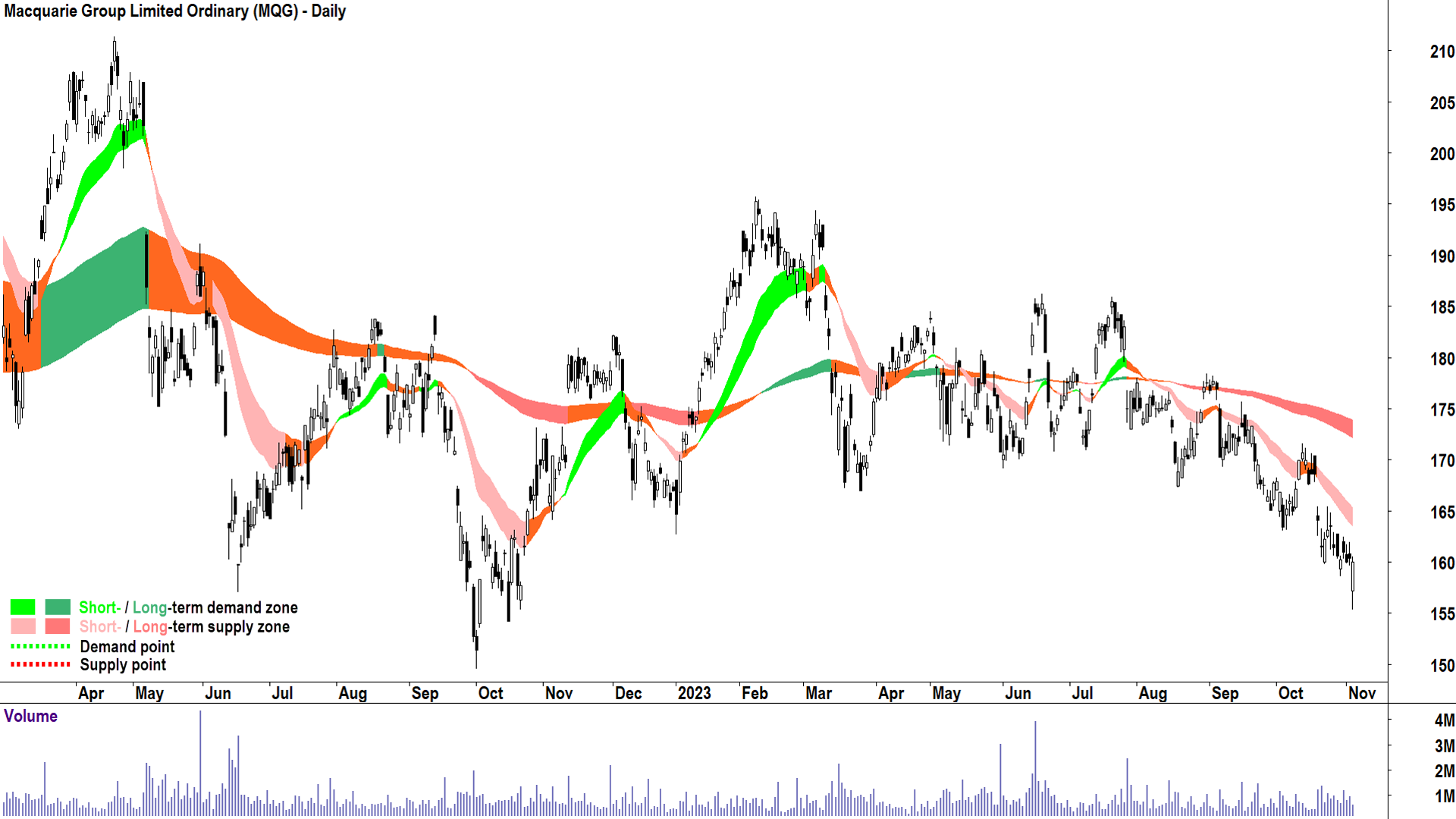The real reason Macquarie Group is starting a $2 billion buyback despite a 40% profit fall
The board of Macquarie Group (ASX: MQG) have approved a $2 billion on-market share buyback and will pay out a dividend at the top end of its payout ratio despite a much tougher environment for financial markets. Group assets under management (AUM) also inched higher in the previous six months, bucking the trend seen in other global investment banks.
Shares have whipsawed in early trade. At the open, Macquarie's share price was down 3% but losses were clawed back quickly.
While some of the Millionaires Factory's annuities and private markets business outperformed, capital market profits collapsed 60% year-on-year due to wide risk aversion in markets. Its large bets in green energy investments also struggled to perform, although Group MD and CEO Shemara Wikramanayake says those asset realisations will come to fruition in the coming six months.
In this wire, I will take you through the key numbers and insights from the Macquarie Group first-half result. We'll also get some colour and insight from Marcus Today's Henry Jennings. Jennings knows the Macquarie business intimately, having formerly worked at the Bank's capital markets team.
.png)
We'll also hear from one of Livewire's very own - Carl Capolingua. Capolingua has decades of experience in financial markets and is an expert technical trader (just like our managing editor Chris Conway).
Key numbers
- 1H net profit -39% year-on-year to $1.415 billion
- Asset management profits -71% year-on-year to $407 million
- Capital markets business profits -32% year-on-year to $1.562 billion
- AUM +2% in H1, thanks primarily to "investments made by MAM Private Markets managed funds and favourable foreign exchange movements"
- Group capital surplus of $10.5 billion
- Annualised return on equity halved from 16.9% (FY23) to 8.7%
- Interim ordinary dividend of $2.55/share, 40% franked (the dividend represents 70% of the payout ratio which is the top end of company policy)
- Approves on-market share buyback of $2 billion
Big buyback = big share price support?
International companies have been initiating fewer buybacks in the current earnings season, reflecting the mood of management boards around the world. Buybacks are generally announced during boon earnings periods. For instance, Expedia Group's (NYSE: EXPE) Q3 results handily beat expectations and a US$5 billion buyback is now on the way.
Having said that, other corporates have used the tool as an opportunity to support the share price with mixed results.
On the one hand, HSBC's (LON: HSBC) Q3 net profit figure disappointed expectations but the announcement of a US$3 billion buyback gave some support to its share price.
On the other, BP (LON: BP) shares fell by more than 4% on its earnings day after earnings came in substantially short of analyst expectations and despite the company keeping its existing share buyback plan.
Macquarie has initiated a $2 billion buyback of its own today. While that hasn't impressed some investors so far in early trade, management argued its $10 billion surplus gives it some wiggle room.
But in classic Macquarie fashion, they won't go all bullish just yet.
"The timing and actual number of shares purchased under the buyback will be subject to a number of factors including the Group’s surplus capital position, market conditions and opportunities to deploy capital by the businesses," it said.
The fast take(s)
We asked Henry and our very own Chris Conway to provide his one-line thoughts on the result. Here is what he said.
- Summarise this result in one sentence: "Whilst it is disappointing, the market has anticipated it to some extent given the volumes and the ability of the bank to recycle assets in a tough environment," Jennings said.
- What is one part of the result you liked and one part of the result you are concerned about: The buyback and dividend should provide some support. However, annualised ROE (return on equity) is not great, down to 8.7%.
- With shares down in early trade, are you buying, holding or selling: We do not hold and we haven’t for a while as we suspected this result was not going to be great. We are happy to sit it out for now.
The results of Macquarie are naturally dictated by financial markets - and management knows this.
"If you're expecting profits to go back to that $2.5 billion level, it's unlikely to happen quickly. It's likely to be a challenging environment for Macquarie moving forward," Conway said.
As a bonus, we asked Henry for his thoughts on why he thinks management has initiated this huge buyback.
"It helps sentiment, the surplus capital is part of it too but the buyback puts a floor under the stock a little. It also helps to suck up any stray sellers from time to time. It is also better than paying dividends as it gives them [management] more flexibility. Once the dividend is paid, it's gone. Buybacks can be suspended and amended, making them more flexible and better than a dividend for the company," he said.
"You wouldn't buy back your own stock in that quantum if you didn't think you were buying it at the right price - that is, a bargain," Conway added.
Capolingua's technical take
Macquarie Group falls into the latter category. You can see my short-term (light pink) and long-term (dark pink) trend ribbons are firmly set to the downside, and as the ribbons are widening and accelerating lower, this is usually a reliable indicator of building excess supply. It looks like aggressive selling versus relatively timid buying - usually not a great time to enter a stock.
I note it has been somewhat of a fighting retreat since the initial break lower in August. Anytime I see a stock steadily falling with white candles, it tells you it's usually getting hit on the open (probably in response to negative overnight moves in the US), and then local investors are buying that dip in session. Today's candle, with its long white body, is another good example of this.
Buying here just doesn't feel like a high-probability bet for me. There's just too much pesky supply around. I'd wait until the price action again shows higher peaks and higher troughs, and preferably, the MQG price is once again trading above my short-term trend ribbon at the very least.

If you'd like to read more about the rest of the Big Bank earnings period (which starts next week), you can read this debrief from Livewire's Glenn Freeman.
3 topics
2 stocks mentioned
4 contributors mentioned

